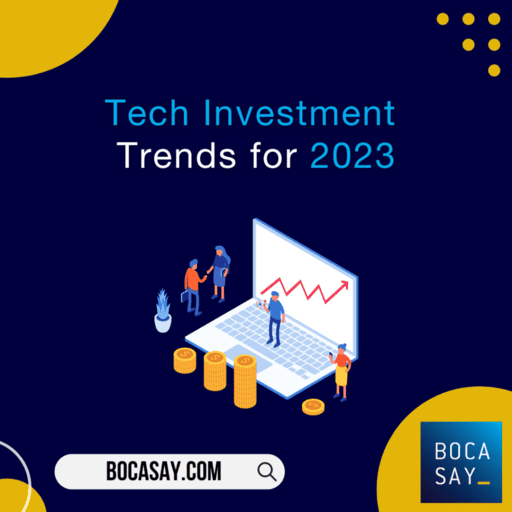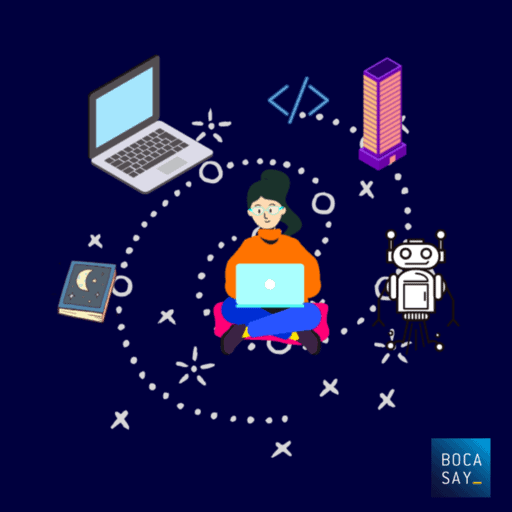Tech Investment Trends for 2023
Despite a series of major world challenges, from a global pandemic to Russia’s invasion of Ukraine, investments in digital technologies show no signs of slowing down in 2023.
The IT sector is booming and the development of emerging technologies has caused a paradigm shift across many industries, in addition to revolutionizing our everyday lives.
For business leaders, strategic investment in technologies that are close to a tipping point can safeguard their companies from geopolitical and economic uncertainties.
Investing in emerging technologies? In this article, Bocasay, our Vietnam offshore development center, provides an overview of the key technology investment areas to look out for in 2023.

Top Tech Investment Areas in 2023
Artificial Intelligence (AI) 🧠
Artificial Intelligence [AI] uses computer systems to simulate human intelligence in order to perform a wide range of tasks which would otherwise be performed by people. Digital devices employing AI are able to:
- Perceive their environments.
- Interact with its environment.
- Collect data.
- Take actions which optimize desired goal achievement.
AI-powered computer systems can perform tasks like:
- Complex decision-making.
- Language translations.
- Financial transactions.
- Visual perception.
- Self correction.
Most importantly, AI is widely anticipated to accelerate and enhance other emerging technologies like robotics, quantum computing and the Internet of Things (IoT).
According to GlobalData’s 2023 TMT predictions, the AI industry will reach $93 billion in 2023, an increase of 12% from the previous year.
Quantum Computing 🚀
Quantum computing is the most advanced computer science currently available. It operates at a subatomic level, a strange world where tiny particles can exist in two places simultaneously.
Quantum computers rely on the laws of quantum mechanics to process massively complex data information, surpassing conventional computers in both speed and energy efficiency. The technology is groundbreaking because it offers a huge leap forward in computer processing power, potentially allowing us to tackle problems too large and complex for conventional computers.
While companies are still unlikely to buy their own quantum computers, they can still rely on a growing Quantum As a Service (QaaS) industry.
By 2025, the quantum market is projected to reach $5 billion and quantum computing on a commercial level is likely to begin by 2027.
𝕎𝕠𝕟𝕕𝕖𝕣𝕚𝕟𝕘 𝕙𝕠𝕨 𝕥𝕠 𝕤𝕥𝕒𝕪 𝕠𝕟 𝕥𝕠𝕡 𝕠𝕗 𝕥𝕖𝕔𝕙𝕟𝕠𝕝𝕠𝕘𝕪 𝕨𝕚𝕥𝕙𝕠𝕦𝕥 𝕤𝕡𝕖𝕟𝕕𝕚𝕟𝕘 𝕥𝕙𝕠𝕦𝕤𝕒𝕟𝕕𝕤? 𝔸𝕕𝕠𝕡𝕥 𝕠𝕗𝕗𝕤𝕙𝕠𝕣𝕖 𝕠𝕦𝕥𝕤𝕠𝕦𝕣𝕔𝕚𝕟𝕘! 𝕆𝕦𝕣 𝕍𝕚𝕖𝕥𝕟𝕒𝕞 𝕠𝕗𝕗𝕤𝕙𝕠𝕣𝕖 𝕕𝕖𝕧𝕖𝕝𝕠𝕡𝕞𝕖𝕟𝕥 𝕔𝕖𝕟𝕥𝕖𝕣 𝕡𝕣𝕠𝕧𝕚𝕕𝕖𝕤 𝕪𝕠𝕦 𝕨𝕚𝕥𝕙 𝕚𝕥𝕤 𝕓𝕖𝕤𝕥 𝕔𝕠𝕝𝕝𝕒𝕓𝕠𝕣𝕒𝕥𝕠𝕣𝕤, 𝕨𝕙𝕠 𝕙𝕒𝕟𝕕𝕝𝕖 𝔸𝕘𝕚𝕝𝕖 𝕞𝕖𝕥𝕙𝕠𝕕𝕤 𝕒𝕟𝕕 𝕥𝕙𝕖 𝕝𝕒𝕥𝕖𝕤𝕥 𝕥𝕖𝕔𝕙𝕟𝕠𝕝𝕠𝕘𝕚𝕖𝕤 𝕥𝕠 𝕡𝕖𝕣𝕗𝕖𝕔𝕥𝕚𝕠𝕟! ℂ𝕠𝕟𝕥𝕒𝕔𝕥 𝕦𝕤 𝕥𝕠𝕕𝕒𝕪 𝕒𝕟𝕕 𝕘𝕖𝕥 𝕒 𝕗𝕣𝕖𝕖 𝕢𝕦𝕠𝕥𝕖!
Internet of Things (IoT) 🌐
The Internet of Things (IoT) refers to a wide range of interconnected digital devices that deploy sensors and real-time data exchange in order to communicate with each other over the internet.
Whether it is a heart monitor implant providing real-time patient data to a medical facility, or a biochip that helps farmers monitor their livestock, IoT applications have an endless potential to drastically change the way we live and conduct business.
For consumers, the fastest-growing IoT markets include automated (smart) homes, interconnected cars and wearable technologies.
Regardless of the challenges presented by the current economic climate, worldwide spending within the IoT market in 2023 is expected to reach a staggering $1.1 trillion.
Robotics 🤖
Robotics is simply the name given to the process of designing, constructing and operating robots. The key goal of robotics involves designing machines that can substitute humans and efficiently replicate human activity in a wide range of fields.
At its most basic, robotics combines the disciplines of computer science and engineering. In reality, developing a robot involves the integration of fields like:
- Mathematics.
- Electrical, mechanical and information engineering.
- Software development.
- Bio-engineering.
There are indeed some sector challenges which include rising inflation and energy costs, as well supply-chain disruptions. However, according to GlobalData’s estimates, the service robot market – mainly autonomous delivery robots and industrial warehouse robots – is expected to generate $55.2 billion in 2023.
Cloud Computing ☁️
Cloud computing essentially refers to an on-demand availability of computer system resources, primarily data storage and computing power, that do not require active management from the end-user.
There are many benefits of cloud computing for companies and they include:
- Cost-savings.
- Protection from data loss.
- Faster time-to-market.
- Increased scalability, flexibility and collaboration.
The overall success of emerging technologies like robotics and IoT will rely heavily on cloud computing services – powered by AI – in order to provide companies with continuous and reliable access to vast amounts of data.
With a 15% growth from the previous year, the global cloud computing market is projected to reach $734 billion by the end of 2023.

Blockchain ⛓️
You can think of blockchain technology as nothing more than a data warehouse, a secure and decentralized database able to record, store and validate the integrity of shared data.
For at least a decade, blockchain technology has been widely known as the building block of the Bitcoin cryptocurrency. By eliminating the need for a central data administrator, blockchain technology is remarkably secure and hacker-proof as it can effectively control data access through a shared digital ledger.
The technology’s unique data-handling advantages include:
- Decentralization.
- Transparency.
- Conflict-resolution.
- Consensus-priority.
While there is no denying that the 2022 collapse of the leading platform FTX has sent shockwaves through the $840 billion cryptocurrency market, 2023 will be a year with increased cryptocurrency regulations, offering greater fund protection and encouraging wider adoption of blockchain applications.
Cybersecurity 🔐
Cybersecurity is nothing more than the practice of defending from malicious cyber attacks:
- Computers.
- Servers.
- Mobile devices.
- Electronic systems.
- Networks.
- Critical data.
These days, no company can succeed without making cybersecurity a top priority. With global cybercrime damage predicted to reach a mind-boggling $10.5 trillion annually by 2025, cyber crime involves damaged or destroyed data, loss of company funds and productivity, as well as severe reputational damage.
According to Cybersecurity Ventures, global cybersecurity spending will exceed $1.75 trillion between the years 2021-2025. As cyber attacks intensify, and relevant industry skills are in short supply, the new year will likely see cybersecurity professionals deploy a zero-trust approach to any incoming data from external sources.